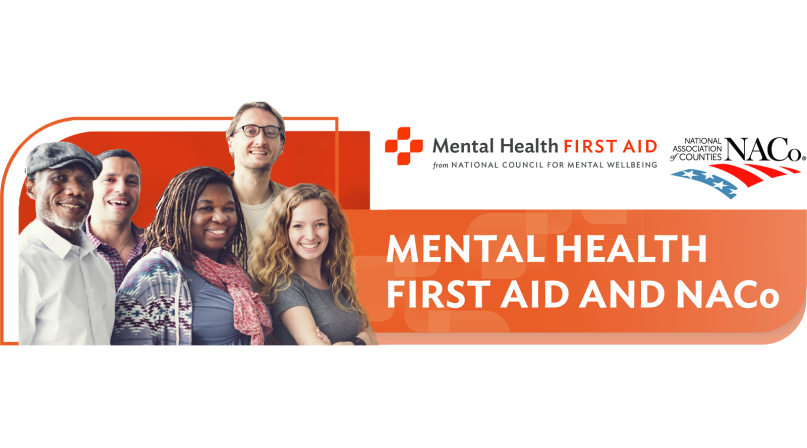Facing a second pandemic: A helping hand for counties from Mental Health First Aid
Upcoming Events
Related News

Key Takeaways
County leaders have told NACo they fear an upcoming “second pandemic” pertaining to COVID-19-related mental health issues that communities are not prepared to face. To help tackle the coming challenges, NACo has partnered with the National Council for Mental Wellbeing to promote the Mental Health First Aid program to help counties deal with mental health challenges in their communities.
Originally created in Australia in 2001 and adapted for use in the United States, the Mental Health First Aid training program educates participants on how to recognize mental illness symptoms and signs of substance use, how to discuss these complicated issues in the workplace and how to fight back against the stigma around mental illness and seeking help.
Learn More
The program is designed to empower county officials of all levels, including fire and emergency medical services personnel, law enforcement and school district employees. The council’s five-step program can help county employees address the difficulties of treating mental health, burnout and other symptoms.
Through the program, participants will “learn risk factors and warning signs for mental health and addiction concerns, strategies for how to help someone in both crisis and non-crisis situations, and where to turn for help.”
With more than 15,000 trained instructors, the council has educated 2.5 million Americans and counting. Instructors focus on teaching the five steps of the program called “The Mental Health First Aid Action Plan.” The five steps are:
- Assess for risk of suicide or harm
- Listen nonjudgmentally
- Give reassurance and information
- Encourage appropriate professional help
- Encourage self-help and other support strategies.
Participants learn by treating symptoms through practice exercises surrounding suicidal thoughts, self-injury, panic attacks, trauma and more. Graduates of the program include police officers, elected leaders, veterans and school employees.
Mental health treatment infrastructure in the United States is mostly lacking. One in five adults face some form of mental illness, while one in 25 face a serious mental illness, according to the National Association of County Behavioral Health and Developmental Disability Directors.
The National Council for Mental Wellbeing-NACo Partnership will provide critical education to participating counties through trained instructors with the goal of making mental health education training “as common as CPR.”

Attachments
Related News

U.S. Congress begins work on budget reconciliation process: What this means for counties
The House and Senate Budget Committees have marked up Fiscal Year (FY) 2025 budget resolutions to initiate the budget reconciliation process to enact policy priorities without garnering bipartisan support, although the two chambers differ in their approach to drafting the legislation.
Panel: People in crisis need support, not handcuffs
Counties can better serve people experiencing a behavioral health crisis by engaging behavioral health specialists instead of law enforcement, experts told county officials at a recent meeting held at NACo headquarters.

Lawmakers reintroduce the Build Housing with Care Act
On January 30, Senator Ron Wyden and Congresswoman Bonamici reintroduced the Build Housing with Care Act. This legislation would establish a new competitive grant program under HUD intended to boost the supply of co-located child care facilities and affordable housing developments.